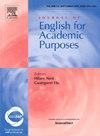活动理论视角下博士生在GAI聊天机器人辅助下的第二语言写作中的策略运用
IF 3.4
1区 文学
Q1 EDUCATION & EDUCATIONAL RESEARCH
引用次数: 0
摘要
生成式人工智能(GAI)聊天机器人(如ChatGPT)已经显著地重塑了写作的格局,为第二语言作家,特别是高级学术水平的作家带来了机遇和挑战。然而,有限的研究调查了学习者主动使用GAI聊天机器人来支持第二语言写作时所采用的策略。为了填补这一空白,本定性案例研究从活动理论的角度探讨了7名博士生在GAI聊天机器人辅助写作中的策略使用。数据从多个来源收集,包括学生与ChatGPT之间的聊天记录、半结构化访谈和学生写作草稿。数据分析显示,博士生通过ChatGPT形成了一个写作社区,在这个社区中,他们使用了六种策略来促进写作过程,提高写作质量。这些策略包括使用代码混合提示、采用写作惯例、遵守研究伦理、确保信息安全、寻求他人的帮助以及以人为本的方法承担多重角色。这些发现为在GAI聊天机器人辅助的第二语言写作中博士生和GAI聊天机器人之间复杂的相互作用提供了有价值的见解,并为在博士写作中负责任地使用GAI聊天机器人提供了有用的启示。本文章由计算机程序翻译,如有差异,请以英文原文为准。
Doctoral student’s strategy use in GAI chatbot-assisted L2 writing: An activity theory perspective
Generative artificial intelligence (GAI) chatbots (e.g., ChatGPT) have significantly reshaped the landscape of writing, presenting both opportunities and challenges for L2 writers, especially at advanced academic levels. However, limited research has examined the strategies learners adopt when they proactively use GAI chatbots to support L2 writing. To fill the void, this qualitative case study explored seven doctoral students’ strategy use in GAI chatbot-assisted writing from an activity theory perspective. Data were collected from multiple sources, including chat logs between students and ChatGPT, semi-structured interviews, and student writing drafts. Data analysis showed that the doctoral students formed a writing community with ChatGPT, in which they used six strategies to boost the writing process and enhance writing quality. These strategies included using code-mixed prompts, employing writing conventions, adhering to research ethics, ensuring information security, seeking help from others, and assuming multiple roles with a human-centered approach. The findings offer valuable insights into the complex interplays between doctoral students and GAI chatbots in GAI chatbot-assisted L2 writing and shed useful light on the responsible use of GAI chatbots in doctoral writing.
求助全文
通过发布文献求助,成功后即可免费获取论文全文。
去求助
来源期刊

Journal of English for Academic Purposes
Multiple-
CiteScore
6.60
自引率
13.30%
发文量
81
审稿时长
57 days
期刊介绍:
The Journal of English for Academic Purposes provides a forum for the dissemination of information and views which enables practitioners of and researchers in EAP to keep current with developments in their field and to contribute to its continued updating. JEAP publishes articles, book reviews, conference reports, and academic exchanges in the linguistic, sociolinguistic and psycholinguistic description of English as it occurs in the contexts of academic study and scholarly exchange itself.
 求助内容:
求助内容: 应助结果提醒方式:
应助结果提醒方式:


